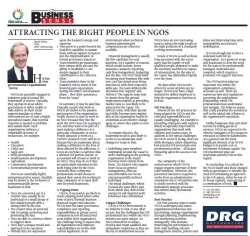David White - CEO, DRG Outsourcing : Attracting The Right People In NGOS2017-04-13 HR For Non-governmental Organisations (NGOs)
NGOs are generally engaged in initiatives geared toward the betterment of society. Typically, they operate in areas where government is either unable to fully deliver on their social support mandate or where interventions are of such a highly specialised nature, that external expertise is needed to mobilise and sustain them. Such organisations embrace a remarkable diversity of endeavours, for example:
A Tipping Point NGOs, if successful, are likely to reach a tipping point where some form of good (formal) business practices require introduction. NGOs have the same governance, compliance and reporting responsibilities as private sector companies across all functional areas within their organisation. The challenge being to ensure that all organisation and employer responsibilities are in line with current legislation, in an environment where technical business administrative competencies are often not available. Financial management is usually the first candidate for such attention, for a number of reasons, which would include: donor assurance, statutory reporting, cash flow management, budgeting and the like. The NGO finds itself becoming more business-like with non-core functional areas being introduced, with their respective skills sets. The team skills profile diversifies into ‘support’ and ‘delivery’. The support team may be drawn from the general employment market, at prevailing market rates i.e. less likely to be attracted by the ‘cause’. The delivery team, with their specialised skills, become more marketable as the organisation builds its credentials as an effective change agent or, where they aspire to new challenges. To remain effective, the leadership model is also likely to evolve to accommodate such changes in scope in that:
HR in a NGO environment is no different to that of any other sectors, but the challenges that HR professionals face within the NGO industry are quite unique. An NGO must strive to attract, develop and retain qualified and enthusiastic employees as they are the key to institutional success. NGOs have an ever-increasing need to attract the right people in the right positions in a constantly evolving environment. Heads of NGOs as well as those long associated with the sector agree that the supply of well qualified people, prepared to make the necessary sacrifices in respect of remuneration, for the sake of the ‘cause’, has diminished rapidly over the years. The days when NGOs were driven by social activists are no longer. NGOs now have a high demand for skilled employees to help the organisation function at its best. HR Practices Almost all the HR practices are being adapted by NGOs and the roles and responsibilities are equally challenging. An example is providing employees with support, which is especially important in organisations that work with children and trauma cases. In addition to the typical challenges the NGO sector is facing, there are skills shortages, salary disparities, best practice HR procedures and government policies âˆ' all factors impacting upon the success of an NGO. The complexity of the endeavours in which NGOs engage requires expertise of their team members. Therefore, the personnel function is required to evolve from an administrative orientation into a HR partner who is closely involved with the institution’s strategic processes that inform daily operational activities. Best-Practice HR best-practice aims to make NGOs understand and assess organisational behaviour and functioning; manage organisations through planning, implementing and monitoring activities strategically. This includes improving the performance of their staff; building effective management systems, policies and plans and improving long-term sustainability and resource mobilisation. It is not enough just to have a dedicated team for an organisation. As it grows in scope and headcount so does the need for the team to be professionally managed, motivated and rewarded, which requires a proficient HR support function. The HR function plays an important role within the organisation’s compliance structure as well. There are numerous laws and regulations governing the employment relationship, which HR professionals must understand and navigate. HR helps to ensure that costly penalties are avoided as well as the added risk of harm to the organisation’s reputation. Unlike businesses that earn their income by selling goods or services, NGOs are expected to be effective managers of the resources entrusted to them by stakeholders. As a general rule the most significant element of an NGOs budget is its people cost or, investment in human capital. The HR practitioner plays an important advisory role in this regard. In concluding, it is critical for the NGO leader and those charged with its governance to identify the need for formalising an approach to the HR aspect, either by way of in-house capacity, outsourcing or a combination of both. T: 031 767 0625 C: 083 782 5515 david@drg.co.za www.drg.co.za |
David White - CEO, DRG Outsourcing : Attracting The Right People In NGOS
Copyright © 2025 KwaZulu-Natal Top Business
